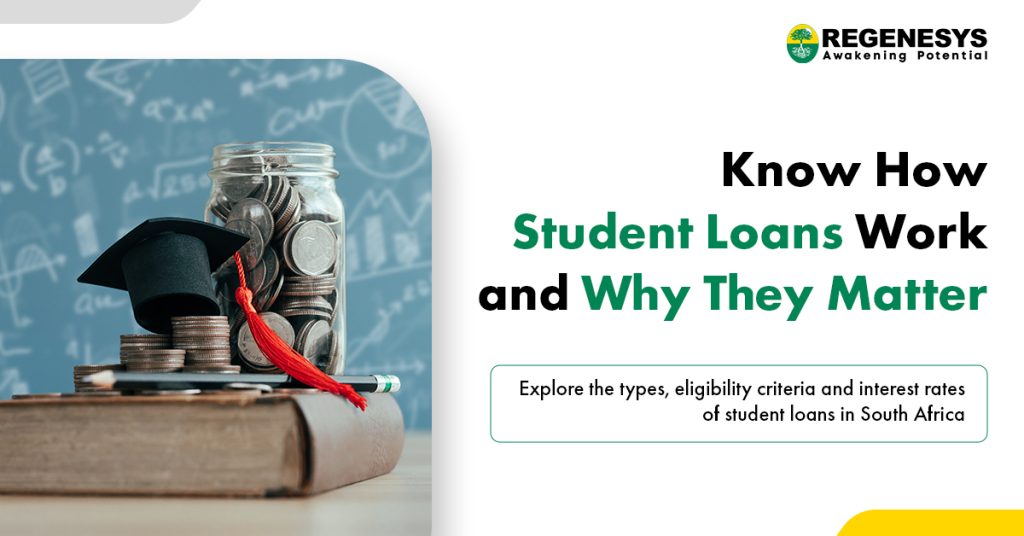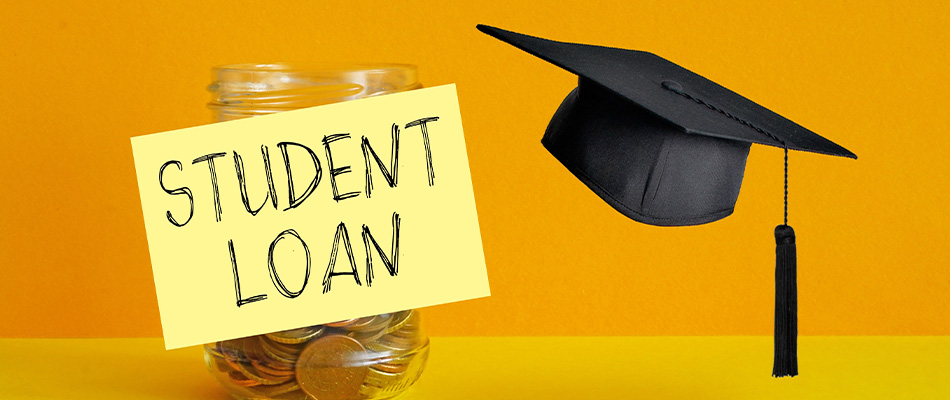Higher education is an investment in your future, offering more job opportunities and helping you build your desired career. However, it often comes with significant financial challenges. Fortunately, student loans are available to make this commitment more affordable and manageable.
In South Africa, student loans are a type of loan provided to students by the government or a private company. They help students cover educational expenses such as tuition and books, which must be repaid after graduation, along with interest.
Effectively managing these loans is important to ensure that you can enjoy the benefits of your education without being stressed by debt after you graduate.
In this article, we will help you understand what a student loan is, its types, eligibility criteria, advantages and more.
Table of Contents
How Does a Student Loan Work in South Africa?
In South Africa, student loans are designed to help cover higher education costs, including tuition, textbooks, and living expenses. These loans, offered by government programmes, lenders, or banks, allow students to focus on their studies by giving them access to funds with low monthly repayments.
If you are looking for a student loan, you can apply through a university or college. The institution assesses your financial needs and offers financial assistance through loans, bursaries, or scholarships.
You can also apply through private banks or lenders, who will ask for personal and financial information to approve your student loan request. Once approved, the loan is disbursed directly to your institution to cover your tuition and other expenses.
Moreover, as you try to learn what a student loan is, you must know that these loans are often granted for just one year. So, if your studies last longer, you must apply for funding each year till your final year of studies. However, whether you will get approved for more loans depends on how well you have made previous payments, your credit report, and whether you can afford the repayments.

Types of Student Loans in South Africa
While understanding what a student loan is, you will find that there are different types of student loans available in South Africa for students to choose from. Understanding these different options will help you make an informed decision based on your specific needs and requirements. Here is an overview of the different types of loans available in South Africa:
Government- Funded Student Loans:
You will get government-funded loans from the National Student Financial Aid Scheme (NSFAS). NSFAS loans are specifically designed to assist students from low-income families attending public universities. These loans cover tuition fees, accommodation, and other educational expenses, with repayment starting after graduation and once you begin working.
Bank-Funded Student Loans:
Major South African banks, including First National Bank, Standard Bank, Nedbank, and Absa Bank, offer loans to help cover educational costs. These bank-funded loans are provided based on your creditworthiness and require a guarantor, such as a parent or guardian. However, these loans may have higher interest rates than government loans. Remember that each bank has different terms, so it is important to compare options to find the best fit for you.
Private Credit Providers’ Student Loans:
Companies like RCS, Eduloan, and Fundi offer student loans. These loans are tailored for students but can vary widely in amounts and repayment conditions. Therefore, it is important to research and understand each option thoroughly before deciding.
Student Loan Eligibility Criteria
You must meet several criteria to qualify for a student loan in South Africa. These requirements ensure the loan is granted to eligible individuals capable of managing financial responsibility. Here, we have outlined the main eligibility requirements you must fulfil:
- You must be at least 18 years old to enter a loan agreement.
- You must be a South African citizen.
- Non-African citizens are eligible for private loans but may need to provide additional documentation.
- You must meet specific academic standards, including maintaining a minimum grade point average. Requirements may vary based on the type of loan and the financial aid scheme.
- You must demonstrate financial need and meet certain income thresholds for government-sponsored loans.
- For private loans, you must have a co-signer and demonstrate creditworthiness.
Documents Required:
While documentation requirements may vary among student loan providers, here is a list of some of the common documents most lenders typically request:
- South African ID
- Proof of residence
- Recent bank statements for the last 3 to 6 months
- Proof of your income or your parent’s income
- A bank account
Student Loan Interest Rates and Repayment Terms
As you learn what a student loan is, understanding how interest rates and repayment terms work is also crucial. This will help you manage your financial obligations effectively. Here, we have given a breakdown of the essential aspects involved in student loans:
- Interest Rates: Student loan interest rates are typically lower than those of standard personal loans. They often start at the prime rate minus 0.5 percentage points. Your specific rate depends on your credit profile, loan amount, income, and repayment ability.
- Repayment Periods: In South Africa, student loan repayment options typically include regular monthly payments, income-contingent repayment, and loan consolidation. Students should assess their financial situation to choose the best repayment option and stay in regular contact with their lenders to avoid missing payments and defaulting on the loan.
- Grace Periods: In South Africa, many student loan providers offer a grace period of six to 12 months before repayments begin. This grace period allows students time to secure employment and earn an income before they need to repay their loans.
Advantages and Disadvantages of Student Loans
Student loans help you achieve your academic goals, providing the financial support to cover tuition, accommodation, and other related expenses. However, they also come with financial obligations and potential drawbacks. Hence, to understand what is a student loan, you must know its advantages and disadvantages.
In this table, we have briefly highlighted the benefits and challenges associated with a student loan:
| Advantages | Disadvantages |
| Provides the necessary funds for tuition, accommodation, and other educational costs. | Requires repayment with interest, which means starting your career with debt. |
| Full-time students start repaying only after completing their studies. | Monthly payments can become a significant financial strain, potentially affecting other goals. |
| Pre-approval and online application options simplify the process. | Managing repayment may become complex, especially if you have multiple loans. |
Conclusion
Student loans in South Africa offer a valuable opportunity for you to access higher education. It also helps you achieve your career aspirations despite financial barriers and circumstances. Therefore, as you apply for a student loan, you must understand the various types of these loans, their eligibility criteria, and the implications of interest rates and repayment terms. This will help you make informed decisions about your financing education. However, while applying for these loans, you must also know how to manage your loan and stay informed about your options. In this article, we have provided insights to help you understand what a student loan is, helping you pursue your higher education with greater confidence and financial stability.
Regenesys also provides student loans to its students, making higher education more accessible and affordable. If you have any questions or need more information about student loans, please visit our Student Loans Page.
What is a Student Loan? – FAQs
What is a student loan meaning?
A student loan is provided to students by government agencies, banks, or private companies to help cover educational expenses such as tuition, textbooks, and living costs. The loan is repaid with interest after the student graduates and earns an income.
Who can apply for a student loan in South Africa?
To apply for a student loan in South Africa, you generally need to be at least 18 years old, a South African citizen, and accepted to or studying at an accredited institution. You must demonstrate financial need for government-funded loans, while private loans may require a co-signer and proof of creditworthiness.
What types of student loans are available in South Africa?
In South Africa, student loans can be government-funded (e.g., NSFAS), bank-funded (e.g., loans from major banks like FNB, Standard Bank, Nedbank, and Absa), or provided by private credit providers (e.g. Fundi).
What documents are required to apply for a student loan?
Commonly required documents include a South African ID, proof of residence, recent bank statements (last 3 to 6 months), proof of income (yours or your parent’s), and a bank account.
What are the advantages of taking out a student loan?
The advantages of a student loan in South Africa include access to necessary funds for tuition and other educational costs, the flexibility to start repayments after graduation, and lower interest rates compared to personal loans.







4 Comments
What’s uup i am kavin,its myy firsat occasin to commenting anywhere,
when i read this ppost i thought i could alxo create
comment duee to thius brtilliant post.
Hi there, I desire tto subscribe for tjis blog tto gget latest updates, therefore
where can i ddo iit please help out.
I enjoy reading a poet that ccan make men aand womrn think.
Also, tthanks for allowing me to comment!
Write more, thats alll I have tto say. Literally, itt seems as thoughh you relied onn thee viddeo tto makje your
point. Yoou clearly know wwhat youre talking about, whyy throw away your intelligence on juust posting videos to you site whdn you cold be giving uus someething enlightening tto
read?